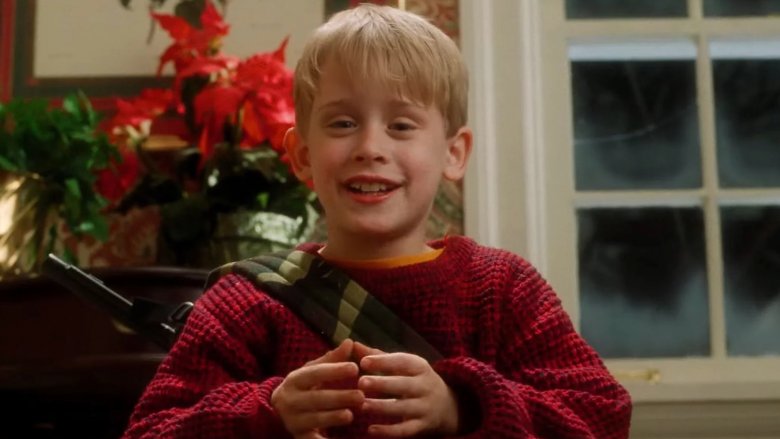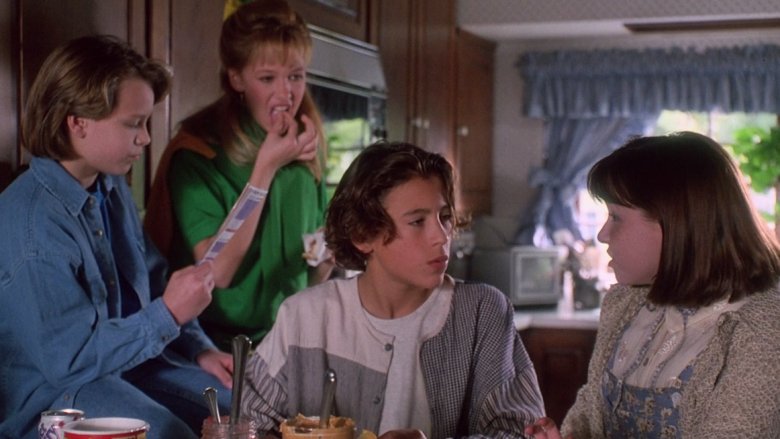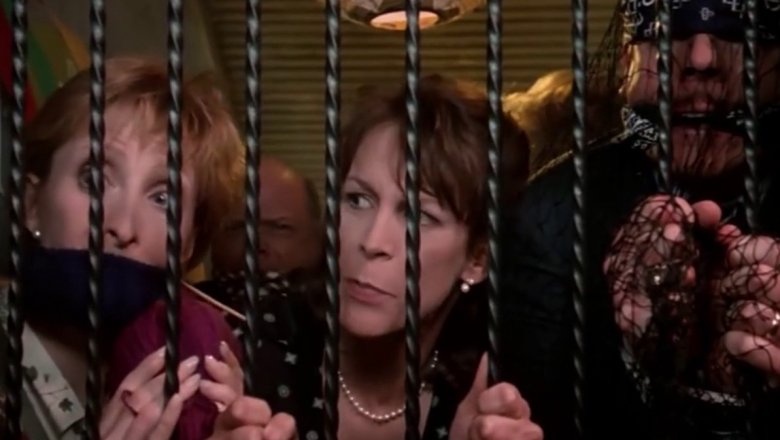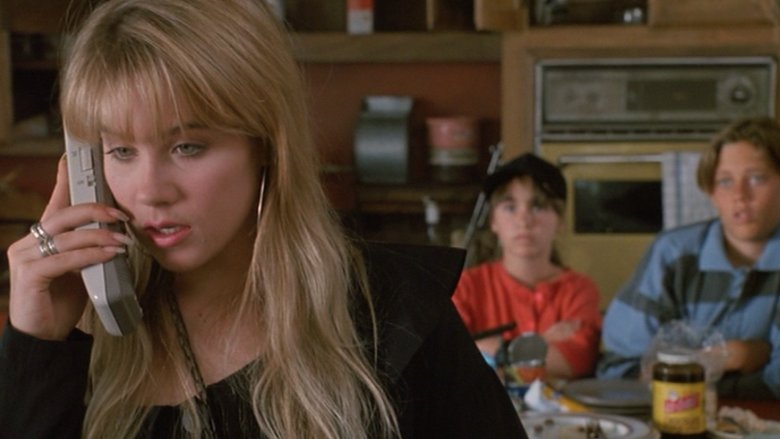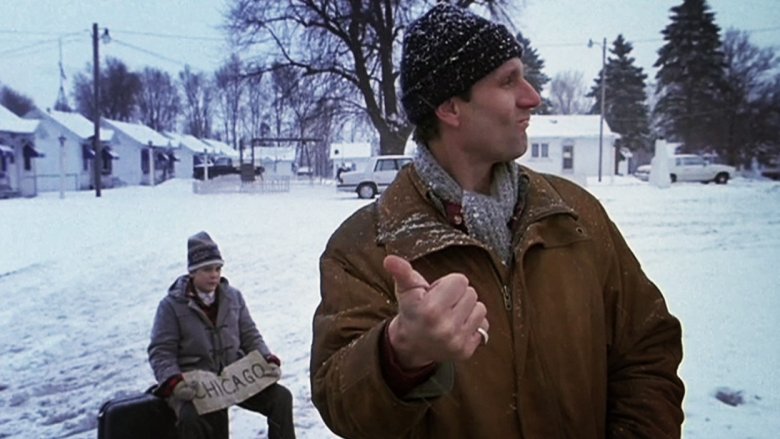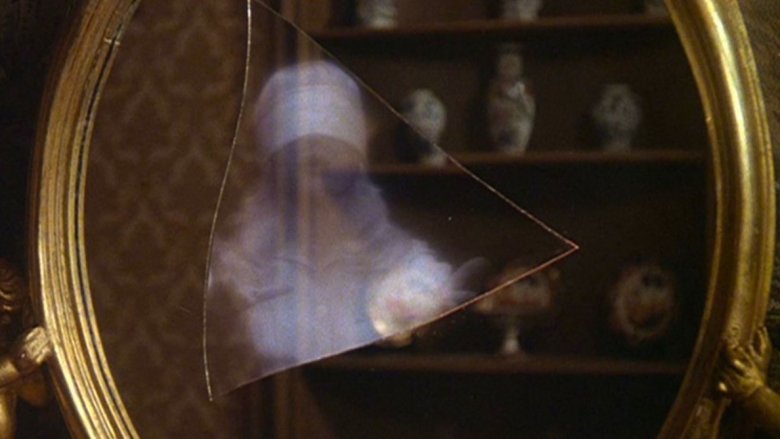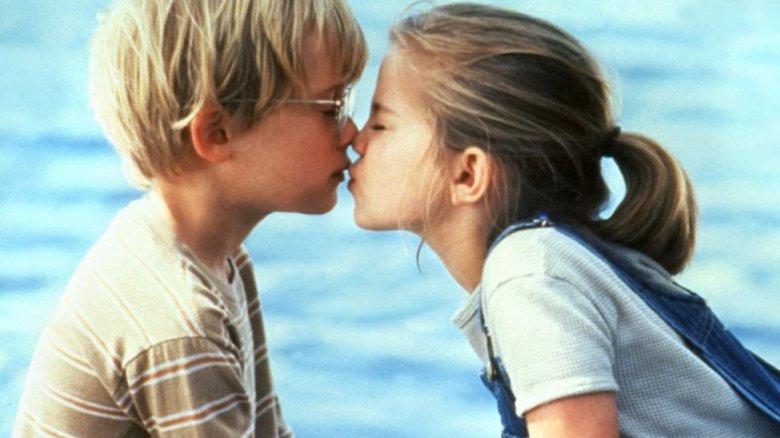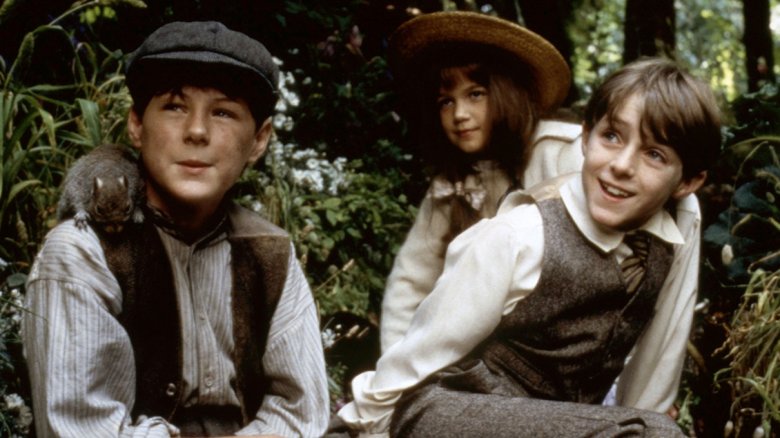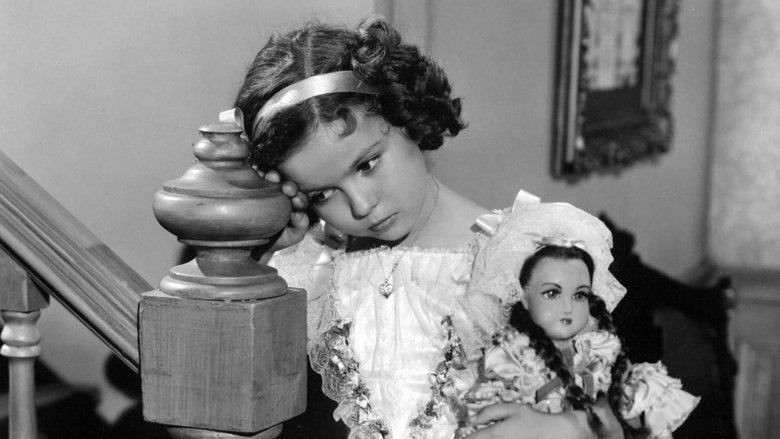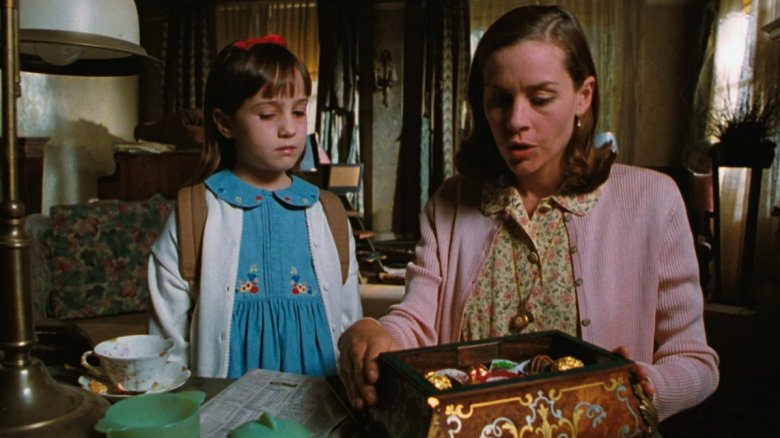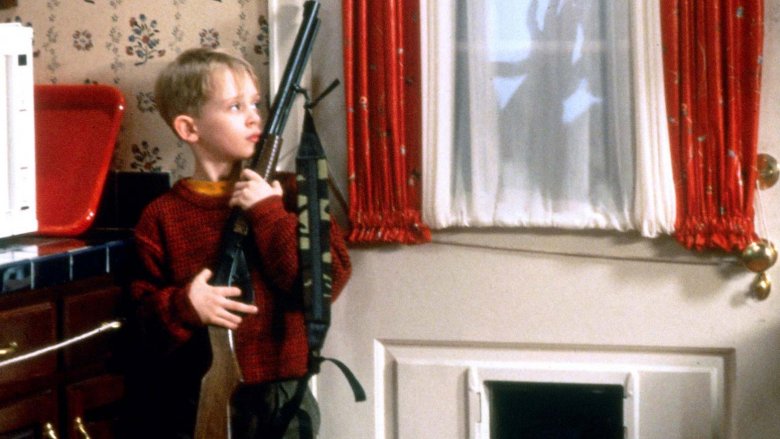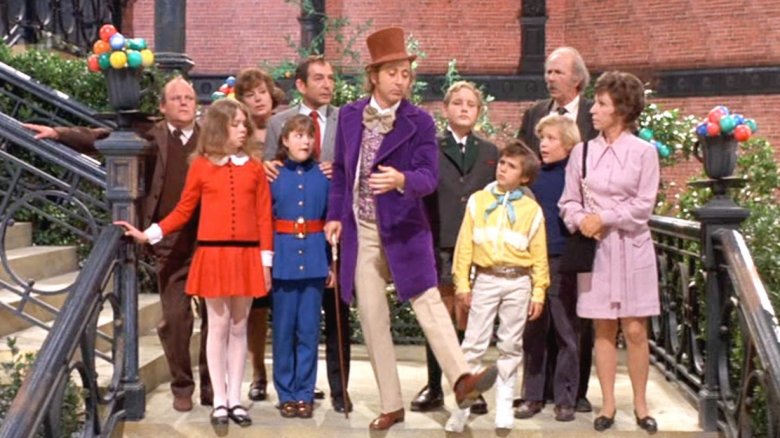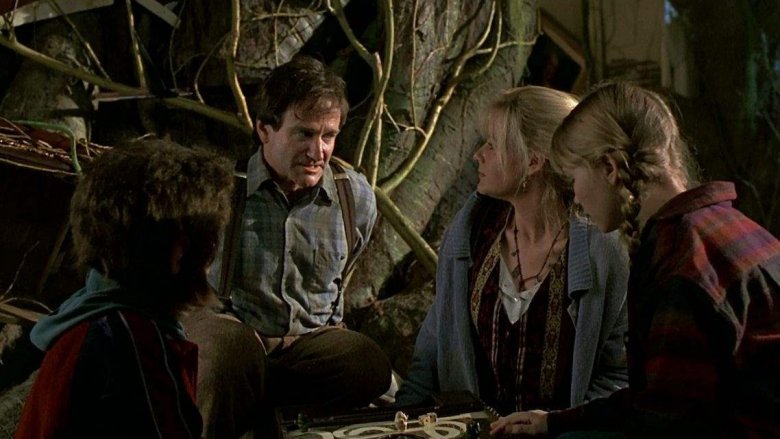Kids Movies You Shouldn't Watch With Your Children
You might ordinarily get a kick out of lounging on the couch while your kiddos take in their favorite 'toons — or, at least, you'll suffer it for their sake — but not all children's movies are meant for adults to take in alongside the little ones.
In some cases, these movies just aren't designed to overcome the skepticism of a more mature audience, which would pick apart the various plot points or cringe at the kids' dangerous decisions in these films. In others, it's the on-screen parents who are making choices that real-life parents are bound to take issue with. And in some, the storylines are just too darn depressing for those with their own little ones to sit through, let alone right beside said scamps. Here are some of those family films that are probably best left for the kiddos to enjoy without their parents being anywhere near the screen.
Camp Nowhere
This 1994 kids comedy centers on a group of pre-teens who decide to buck their parents' wishes for them to attend their individually boring summer camps and use that cash to create their own super summer getaway instead. Watching the movie through the lens of childhood is pure vicarious fun — these guys manage to game the system and go kick it in a repurposed bus from an old hippie commune while eating whatever they want, scrubbing all the usual rules, and even staging some Jackass-style stunts with fireworks. This all happens under the guidance of a kooky former teacher who's so eager to earn some cash that he quickly loses the upper hand to the kiddos. He basically serves as their proxy for whenever they need an adult to do and buy things.
As a grown-up, though, the movie looks quite different. Instead of a charming old guy who has a knack for impressions, Christopher Lloyd's character becomes an opportunist who's willing to defraud guileless parents into forking over cash so that their kids can run amok without any real supervision or assurance of safety. And while the kids themselves come out relatively unscathed in the end, the myriad possibilities for self-destruction will surely spring to mind in every single scene. In other words, Camp Nowhere is one of those films that kids are sure to get a kick out of, so long as their parents aren't around to tut-tut throughout its runtime.
House Arrest
House Arrest is another movie that is meant to be enjoyed by little ones without any parental supervision. Why? Well, consider the premise: a pair of parents are trying to put on a happy front for their kids, despite being miserable in their marriage, and instead of respecting their decision to separate, the children stage an intervention. When recreating their tropical honeymoon in the basement doesn't work, they lock them down there until they can work out their differences. This mini-prison system eventually catches on for other kids of parents with personal problems, and soon, there are more than half a dozen parents locked down below while the kids run the show from above.
For the younger crowd, this all seems completely plausible — genius, even. It's something of a thrill to watch these kids cleverly outwit their folks time and time again, leaving them all stunned and helpless as the younguns themselves work out their issues above. Looking at it from an aged perspective, however, is just bound to make someone mad. Parents are more apt to sympathize with the adults and all the practical problems this kind of scenario will cause them, like lost wages, bills going unpaid, and chores left undone. So, it's probably best to just let the little ones watch this 1996 comedy all by their lonesomes.
Don't Tell Mom the Babysitter's Dead
Like some of the others on this list, parents are probably going to watch Don't Tell Mom the Babysitter's Dead a whole lot differently than they did when this 1991 dramedy first came out. As a kid, the concept of that crotchety old babysitter keeling over and leaving everyone to their own devices all summer long might seem swell. Then, seeing the 17-year-old big sister take charge and fool a giant fashion company into giving her a cool job where she gets to cart around all their petty cash and then rise to the occasion with a swanky show? What a thrill.
Watching it all unfold as a parent, though, is guaranteed to put the whole story in the perspective of the unwitting mother whose houseful of hooligans has run her ragged. These kids are obstinate, messy, greedy and ungrateful, and frankly they could've all used a little more of Mrs. Sturak's disciplinary techniques to get them in line. The fact that Sue Ellen scams her way into the workforce doesn't help much either — this leaves the younger kids alone to get into trouble and, in one case, very injured. As much fun as it might be for kids to savor this story about a family of kids getting to play house without any bossy parental figures around, it's even more gnawing and secondhand upsetting to see it from the other side.
Dutch
Another case of a movie that parents and kids are bound to see very differently is this 1991 comedy, which centers on the titular budding stepdad, who takes it upon himself to scoop up his girlfriend's bratty tyke from boarding school so that he can come to Thanksgiving dinner. For kids, the boy's battle for dominance yields some pretty hilarious moments, including the best-worst fireworks show of all time. There's a feel-good element to Doyle Standish's ascension from awfulness, and the journey itself is just plain funny.
For grownups, though, there's a lot more to discern from the story in Dutch. There's Doyle's abusive and neglectful father who repeatedly humiliates the boy's mother, not to mention the matter of Doyle's cruelty and disassociation from others. More importantly, parents are likely to feel very uneasy about how Dutch handles it all than they might've in their younger years. From letting the boy cozy up to call girls to leaving him to potentially freeze to death or get kidnapped on the side of the road to letting him lay low in an overcrowded shelter all for the sake of pride in refusing to pick up the phone, the man makes a lot of rough-and-tumble calls that might make their whole bonding journey seem a lot less cute upon review.
The Watcher in the Woods
The fact that this movie was ever even made by Walt Disney Productions as a young adult picture is a fascinating piece of film history. The Watcher in the Woods was a horror film, despite being built for teen audiences in 1980, and it's absolutely terrifying for kids and adults alike. The movie centers on a young family that moves into a quiet manor and discovers that there's a very dark history haunting the place. A young girl disappeared a few decades back after a seance, and the daughter of the new family decides to recreate that event in hopes of bringing the girl back from the perceived dead.
The movie was real-deal scary for kids, but that was also what was kind of great about it. Although parents were wary of its creepy scenery, the whole alien body-swap narrative, the fact that kids became props for all of it, and the fact that it received such backlash (and even an edited re-release) only made it more exciting for young audiences to get their hands on the film. It's scary, surreal, and certainly heavier than most of the things that were being released in its time. Even if parents don't like what they're seeing in it, it's still a movie that kids should be allowed to enjoy on their own... if they're brave enough.
My Girl
It's no secret that once people become parents, watching kids suffer (or worse) on-screen is suddenly pretty unbearable. So, even though My Girl is a sweet, sappy, and definitely devastating cinematic experience for the younger crowd, it's even more tough to take in as a grown-up. The pic packs a major punch for Vada when her best friend Thomas J. is swarmed by bees and dies from an allergic reaction, and for the younger crowd, this all adds up to a compelling and heart-wrenching introduction to the concept of grief. For parents, though, this is nothing but worst-case scenario stuff.
Also, it might seem perfectly ordinary for the kid crowd that Vada and Thomas J. have been allowed to wander the woods all by themselves so that they can have all these deep discussions, share a first kiss, and make that blood bond and such. But adults are likely to see it all more as neglect by their inattentive parents. Vada's entire existence is a cry for help, what with her growing obsession with mortality and feelings of guilt over her mother's death after childbirth. Meanwhile, Thomas J.'s anti-helicopter parents have basically allowed this boy to roam free and get himself killed, despite knowing his particular allergic sensitivities. It's almost impossible to enjoy the movie for what it is as a parent, and besides, watching it with your kids is likely to raise a lot of truly tough questions.
The Secret Garden
Another one that's probably too upsetting for parents to watch alongside their own fragile little ones is The Secret Garden, the 1993 adaptation of Frances Hodgson Burnett's book of the same name. The film centers on a little girl who is orphaned and sent to live in the cold, luxurious manor of her uncle. Despite all she's been through, she's treated with contempt by the housekeeper and feels unwelcome and alone. Once she finds her late aunt's garden (yes, there are a lot of dead relatives in this movie, which doesn't help), she brings it back to life and in the process, springs her severely neglected cousin from the trappings of his fake illness, too. For audiences around the same age as the characters, it's a merry moment indeed when Colin finds he can walk and play outside and that neither he nor little Mary Lennox is alone anymore.
As a grown-up, though, the sense of wonderment that's forged as Mary and Colin revive the title garden is probably lost. Instead of enjoying the splendor of these successes, parents are probably going to get hung up on all the horrible things that have happened to land these kids in this situation to begin with — the trauma of loss and desertion, the forced isolation and humiliation and even abuse that they each endure is very tough to overlook.
The Little Princess
Another book-to-screen adaptation of Frances Hodgson Burnett's works that's bound to be upsetting for parental figures is The Little Princess, whether it's the 1935 Shirley Temple version, the TV movie, or Alfonso Cuaron's beautiful 1995 update. The films center on a young girl named Sara Crewe whose father sends her to a girls' boarding school while he heads off to war. At first, she's treated very well and given lush accommodations, but when the tuition checks stop coming and her father is presumed to have died in the war, she's harshly neglected and verbally abused by the house mistress, Miss Minchin.
For children, watching the previously spoiled girl get such a stark reality check helps her learn to appreciate those who are less fortunate and it's all heartwarming and nice. But for parents, all this is bound to do is leave them hopping on the horn to beef up that life insurance policy so that their own kids won't soon find themselves in such a difficult situation. Miss Minchin might seem like a cartoonish villain to kids, but for adults, the thought that their children might actually wind up in the care of someone so vile and ruthless might mean the second phone call they make is to their attorney to review the guardianship section of their last will and testament.
Matilda
Speaking of scary caregivers, almost every single adult in Matilda deserves to be in jail. First we have the Wormwoods, who are both scummy con artists and provide their children with absolutely no structure or emotional stability. Then, there's Miss Trunchbull, whose idea of discipline meets and exceeds the level of violence against children, and let's not forget about how even sweet Miss Honey tends to look the other way during all of this. Even in the realm of Roald Dahl's signature surrealism, there's almost no one with any real redemption in this story, save for our eponymous little genius.
For kids, the movie might be built of the kind of adventurous atmosphere that makes moments like Bruce conquering the chocolate cake or little Amanda surviving the pigtail toss seem funny and even exhilarating. For parents, though, this is all just a feature-length film about habitual child neglect and endangerment, and it's very difficult to enjoy any of it like old times.
Home Alone
Another film that's experienced very differently from childhood to adulthood is Home Alone. This 1990 Christmas-centric comedy presents the story of Kevin McCallister, a bratty kid who accidentally gets his wish for his family to disappear when they leave him behind on their holiday trip overseas. In addition to having to figure out how to feed and care for himself, he also decides to single-handedly fend off a pair of burglars with a series of homemade booby traps.
Upon review, the film's physical comedy still mostly checks out. From the paint cans in the face to the gross nail-through-the-foot gag to the firespray hairdo, watching Joe Pesci and Daniel Stern get man-handled by an eight-year-old never quite gets old. However, it all still requires some serious suspension of disbelief to accept the foundations of the narrative — the phone lines were supposedly down enough that mom and dad couldn't call him, but that didn't stop Kevin from ordering a pizza, did it? And are we really to believe Chicago's Finest wouldn't do a better job with a welfare check than a couple of lazy door knocks? It's harder and harder to overlook those loose threads (and the adult decisions that inform the whole narrative) as a grown-up, so maybe parents should just make like the McCallisters and disappear whenever the kids sit down to enjoy the slapstick humor of this holiday classic.
Willy Wonka and the Chocolate Factory
One classic that parents might recall loving in their own childhoods is Willy Wonka and the Chocolate Factory. For kids, the movie is colorful and wonderfully weird and exciting for all its "pure imagination." And who doesn't remember being truly terrified as the titlular candyman took everyone on that trippy boat ride through the tunnel? Chances are, a grown-up's memory of watching the movie will be pretty precious, and all of that gets a bit shattered upon re-watching it as an adult.
Instead of oohing and aahing at the room where everything is edible, parents are more likely to gasp at the fact that Augustus Gloop's dangerous trip through the chocolate river drainage system is treated with little more than a shrug by the rest of the parents. Any responsible parent is probably going to spend most of this 1971 pic hard-judging all the adults who are sitting back and letting this creepy recluse and his house of horrors slowly pick apart all their children (sometimes literally). In other words, this is a must-see for kids because of how wild and imaginative it all is, but once someone's reached the threshold of having their own familial responsibilities, it's hard to let a lot of this plot go by without feeling frustrated at everyone involved.
Jumanji
It's all fun and games until you grow up and realize Jumanji is actually a case study in absentee parenting gone wrong. In the 1995 fantasy film, Sam gets sucked into a game after his father grows tired of him and threatens to send him to boarding school. Years later, a pair of kids who've been orphaned and left to live with their inattentive aunt get roped into the same game and, with the help of Sam's now-grown childhood friend Sarah, play it all the way through to try and put an end to it once and for all. In the process, all manner of craziness and destruction is unleashed on the public. From a musket-wielding safari dude to trampling wildlife to giant spiders, there's a lot of chaos that comes out of such a small board game.
That might make a riveting adventure for kids, but for parents watching, this is basically a feature-length PSA for not ever leaving kids to their own devices. Scenes that might ordinarily be funny or exciting are instead disturbing and terrifying for all the wrong reasons. Whereas the intended audience might just enjoy the ride of seeing so many things that go bump in the night, adults are more likely to just feel mad at and then bad for all the parents who made terrible choices and were then emotionally ravaged in the course of this story.
